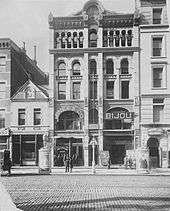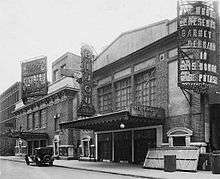Bijou Theatre (Manhattan)
Two Broadway theatres have been named the Bijou Theatre.
1239 Broadway

The Theatre Brighton,[1] at 1239 Broadway between 30th and 31st Streets, had been converted from a drinking and gambling establishment into a theatre for variety, and opened August 26, 1878 with Jerry Thomas as proprietor.[2] The house had many changes and names until John A. McCaull, a Baltimore lawyer, and Charles E. Ford took charge of it. Considerable money was spent and when they reöpened the house on March 31, 1880, as the Bijou Opera-house, it looked like a modern and well-regulated theatre.[3][4] In 1881 and 1882, Lillian Russell appeared in three different operettas.[5][6]
But the house proved too small to be profitable,[note 1] so after the performance of July 7, 1883 preparations for tearing it down were at once commenced:[7] R. E. J. Miles and Gen. W. B. Barton leased the premises for five years from its owner, Edward F. James. They agreed to advance sufficient funds to erect a new house, which was designed by J. B. McElfatrick & Son and opened Dec. 1, 1883 as the Bijou Theatre.[8] The first production was Orpheus and Eurydice, an adaption by Max Freeman of Jacques Offenbach's Orfée aux enfers."[9][10][11]
Adonis, starring Henry E. Dixey, played its record-breaking run of 603 performances at the Bijou beginning September 4, 1884. Another long run was The Music Master, starring David Warfield, transferred from the Belasco Theatre on January 9, 1905,[12] and playing 511 performances, for a total at the two theaters of 635, before closing September 29, 1906. The next big hit was A Gentleman from Mississippi, starring Thomas A. Wise and Douglas Fairbanks, which opened September 29, 1908.[13] From June 29 to August 7, 1909, it played at the Aerial Gardens atop the New Amsterdam Theatre, with new scenery and costumes,[14] moving back to the Bijou August 9. After giving its 400th performance (counting the Aerial Gardens) on August 25, the play closed on September 18.[15][16]
The Bijou was later used as a silent movie house. It was demolished in 1915 and replaced by the present high-rise office building, which opened in 1917.[17][18][19]
Selected shows
- Adonis (1884-86; 603 perf.)
- A Midnight Bell (1889; 136 perf.)
- The Widow Jones (1895), basis for 1896 Edison short film The Kiss
- Courted Into Court (1896-97; 140 perf.)
- Sister Mary by Glen MacDonough (1889-1900; 120 perf.)
- The Climbers by Clyde Fitch (1901; 163 perf.)
- The Auctioneer by Charles Klein (1901; 105 perf.)
- Nancy Brown (1903; 112 perf.)
- A Gentleman from Mississippi (1908-09)
- The Music Master (1905-06; 627 counting 124 shows at Belasco)
- The Lottery Man (1909-10; 200 perf.)
209 West 45th Street

The second Bijou Theatre was built by the Shubert family in 1917 at 209 W. 45th Street in New York City.[20][21][22] It was one of three theaters that hosted the premiere season of the musical Fancy Free—but primarily it presented plays by many writers, including Sacha Guitry, John Galsworthy, A. A. Milne, James M. Barrie, Herman J. Mankiewicz, Leslie Howard, Anton Chekhov, Henrik Ibsen, Luigi Pirandello, Graham Greene, Eugene O'Neill, William Saroyan, and Seán O'Casey.
In 1950, as the Bijou, it hosted one film, Cyrano de Bergerac, starring José Ferrer.[23]
In 1951, it became a CBS radio studio, then—as the D. W. Griffith Theatre—it presented art films. It was reinstated as the Bijou Theatre in 1965, but was demolished in 1982 to make room for the Marriott Marquis Hotel.
References
| Wikimedia Commons has media related to Bijou Theatre (Manhattan). |
Short citations
- ↑ The Sun (New York). 1878-08-25.
- ↑ Brown:273
- ↑ Brown:274
- ↑ The New York Times. 1880-04-01
- ↑ The Sun (New York). 1881-10-30
- ↑ The New York Times. 1881-10-30, 1881-12-20, and 1882-06-06
- ↑ The New York Times. 1883-07-29
- ↑ Real Estate Record. 1883-07-21
- ↑ Brown:281
- ↑ The New York Times. 1883-08-19
- ↑ The Sun (New York). 1883-12-02
- ↑ The New York Times. 1905-01-10
- ↑ The New York Times. 1908-09-30
- ↑ The Sun (New York). 1909-06-30
- ↑ The Sun (New York). 1909-08-22.
- ↑ The Sun (New York). 1909-09-10.
- ↑ Kenrick
- ↑ Internet Broadway Database website. "Bijou Theatre"
- ↑ Emporis website
- ↑ Internet Broadway Database website. "Toho Cinema"
- ↑ Cinema Treasures website. "Bijou Theatre"
- ↑ The New York Times. 1917-04-13
- ↑ The New York Times. 1950-11-17
Note
- ↑ The plot is only 40 feet wide. See The New York Times. 1915-01-10.
Full citations
- Brown, T. Allston (1903). A History of the New York Stage. Vol. 3. New York: Dodd, Mead and Company. Online at Google Books.
- Cinema Treasures website. "Bijou Theatre"
- Emporis website. "1239 Broadway"
- Internet Broadway Database website. "Bijou Theatre"
- Internet Broadway Database website. "Toho Cinema"
- Kenrick, John. Musicals101.com website. "Bijou Opera House"
- Real Estate Record and Builders' Guide Vol. 32 No. 801 (July 21, 1883), "Buildings Projected. New York City" (p. 537, col. 3), "Broadway, Nos. 1237 and 1239", p. 538, col. 1. Online at Internet Archive.
- The New York Times. 1880-04-01. "Record of Amusements. Bijou Opera-House"
- The New York Times. 1881-10-30. "Amusements. Bijou Theatre." (scroll down)
- The New York Times. 1881-12-20. "Bijou Opera-house"
- The New York Times. 1882-06-06. "Amusements. General Mention." 2nd paragraph
- The New York Times. 1883-07-29. "Amusements. General Mention", paragraph 20: "What was the Bijou Opera-house is now an open space, where foundations will be laid immediately for a new theatre."
- The New York Times. 1883-08-19. "Bijou Opera-house"
- The New York Times. 1905-01-10. "Fire Scare at the Bijou"
- The New York Times. 1908-09-30. "New Comedy at Bijou; A Night of Laughter"
- The New York Times. 1915-01-10. "Times Square and Old Theatre Section Give Active Tone to New Realty Year", col. 4
- The New York Times. 1917-04-13. "Tense Melodrama by Eugene Walter"
- The New York Times. 1950-11-17. Crowther, Bosley. "Cyrano de Bergerac (1950)"
- The Sun (New York). 1878-08-25. Advertisement for Theatre Brighton, p. 8, col. 3. Online at Library of Congress.
- The Sun (New York). 1881-10-30. "Audran's New Opera, The Snake Charmer", p. 5, col. 4. Online at Library of Congress.
- The Sun (New York). 1883-12-02. "Amusements. Orpheus and Eurydice at the Bijou", p. 5, col. 6. Online at Library of Congress.
- The Sun (New York). 1909-06-30. "New Home for A Gentleman from Mississippi", p. 7, col. 3 (bottom). Online at Library of Congress.
- The Sun (New York). 1909-08-08. "Plays of the New Season", and advertisement for Bijou Theatre, Third Section, p. 6. Online at Library of Congress.
- The Sun (New York). 1909-08-22. "Two New Detective Plays", Third Section, p. 6, col. 2, second item. Online at Library of Congress.
- The Sun (New York). 1909-09-10. "News of Plays and Players", p. 9, col. 4. Online at Library of Congress.
Coordinates: 40°44′50″N 73°59′19″W / 40.74721°N 73.988584°W